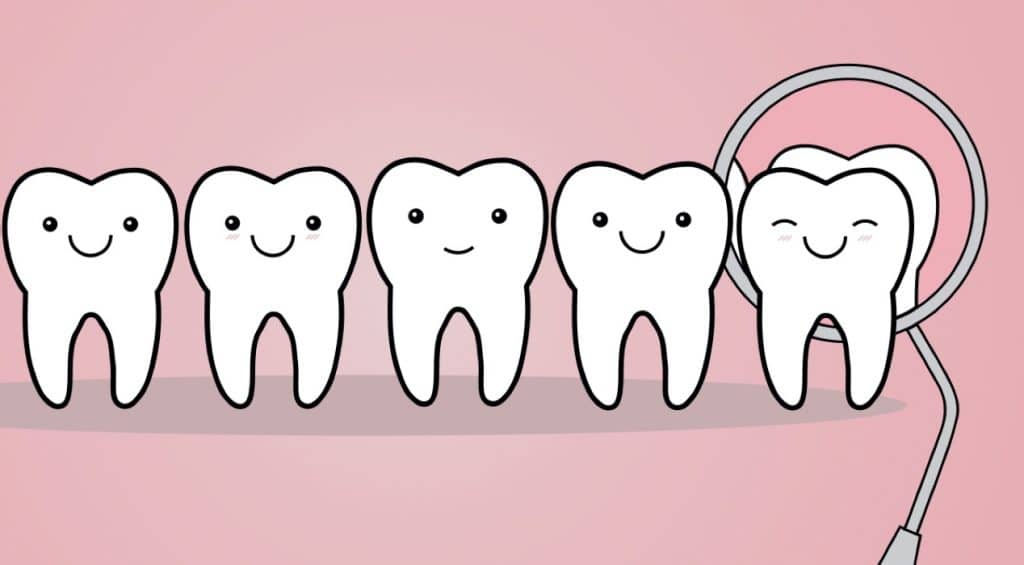

The ACS estimates that in 2020 there will be about 53,000 new cases of oropharyngeal or oral cancer in the USA; and around 11,000 patients will die of these diseases.
If you can detect it in early stages, before it spreads to other parts, then you have up to a 92% chance of surviving according to the ACS.

Mother - General Dentist - Blogger
Cancer is probably the most feared word and disease today. And it’s a well-earned reputation. This devastating disease not only threatens your health, but also causes psychological, professional and even economic issues.
Although oral cancer is not as lethal as other types of cancer, the impact it has on your life is the same as all other types. This is why it’s so important to stay up to date on symptoms, risks, and ways to prevent it.
Luckily for you, in this article we share everything you need to know about oral cancer; so keep reading!
Let’s start with a quick review of what cancer is:
In a few words, cancer happens when cells (in almost any part of the body) grow out of control and form a tumor. If you don’t detect it in time; and don’t get the proper treatment, it can spread to other parts of the body. This process is known as metastasis.
With that being said; oral and oropharyngeal cancer a.k.a. oral cavity cancer or mouth cancer, is basically cancer that has its origin in any part of the mouth. This includes the tongue, cheeks, roof of the mouth, lip, gums, glands, tonsils and pharynx (the part that connects your mouth to your windpipe).
If you want an extensive explanation about all types of cancer you can visit the American Cancer Society (ACS), after finishing this article of course!
The ACS estimates that in 2020 there will be about 53,000 new cases of oropharyngeal or oral cancer in the USA; and around 11,000 patients will die of these diseases.
ASC research say that men are more likely to get oral cancer than women, and the average age at diagnosis is 62. However it can affect young people; in fact, around 25% of diagnosed patients are people younger than 55.
The survival rate is relatively high compared to other types of cancer; if it’s detected in early stages, before it spreads to other parts, then a patient has up to a 92% chance of surviving according to the ACS.
As you can see, early diagnosis is essential. All you need to do is visit a dentist and get a brush biopsy. SHD Preventive and Comprehensive dental plans offer brush biopsy coverage. To learn more about dental plans call us now at (866) 664-0276 and get a free quote in less than five minutes.
When it comes to determining what causes oral cancer there is only one certainty – there are no certainties. And this only makes things worse because not knowing exactly how it happens makes prevention difficult.
In general, instead of actual causes, scientists talk about risk factors, which are behaviors that seem to cause cells to grow out of control.
The risk factors include smoking or chewing tobacco and derived products, excessive alcohol consumption, human papilloma virus (HPV), and previously having head and neck cancer.
Other factors associated with oral cancer are an unhealthy diet, excessive UV light exposure, weakened immune system, age, gender, and genetic mutations.
Call us now and get a free quote. Plans starting as low as around $1/day.

Signs are not clearly visible at the early stages; if you smoke, drink, or have HPV (or had at some point), it’s very important to get tested regularly. Seniors should be careful too, as the average age at diagnosis is 62. At an advanced stage there are some visible symptoms of oral cancer, these include:
Be careful! Oral cancer is often confused with other problems, do not diagnose yourself, if you think you might have it, then talk to your dentist and get a brush biopsy asap! If you need help covering the bills make sure to give us a call now at (866) 664-0276 to get a dental plan.
Remember I said not knowing what causes it only makes things worse? Well, because we can’t really identify the reason why oral cancer appears (yet), it’s actually almost impossible to establish a reliable prevention method.
Sadly, not all cases can be prevented, but you can reduce the hazard by avoiding certain risk factors:
Again, tobacco and alcohol are #1 and #2 in the list of harmful behaviors. No matter how long have you been drinking or smoking, quitting greatly lowers your risk of developing not only this but other types of cancer even after many years of use.
If you have human papilloma virus (HPV) you might have oral cancer and don’t even know it. In fact, you may have HPV and don’t even know it. HPV is a sexual transmission infection that rarely shows symptoms but frequently leads to cancer. According to the ACS, practicing safe oral sex (whatever that means) and limiting the number of sexual partners (to 1 if possible) are the best shields against both diseases.
Obviously, one of the best ways to prevent oral cancer is by simply visiting your dentist. As I said before, early diagnosis is essential to prevent spread and potentially increase your survival rate.
Make sure to have a dental plan that offers coverage on preventive procedures.
Who doesn’t love a sunny day? But UV light is a risk factor not only for your skin but also for your lips (and no, lipstick won’t protect you). Make sure to use plenty of sunscreen when you go outside during the day. Wearing a hat is also a good idea. Besides let’s be honest, Hats are chic!
That’s right, although we still can’t say for sure which foods might cause or prevent oral cancer, the ACS recommends to choose a diet rich in whole-grain breads, pastas, and cereals instead of refined grains, and eating fish, poultry, or beans instead of processed meats and red meats.
Facing cancer of any type will never be easy. It really is a disease that changes your world forever. Not only will it have a toll on your overall health, it also has a negative impact on every aspect of your life and your family’s.
That’s why I always encourage my patients to avoid risk factors as much as possible. There is still a lot we don’t know about cancer and every little effort to fight it (or prevent it) counts.
As I said before, If you think you might have oral cancer, don’t hesitate to see your dentist as catching it early will increase your chances of becoming a survivor.
If you currently have oral cancer please stick to your treatment, follow your doctor’s advise, and rely on your loved ones to keep your spirit strong. Cancer is a tough enemy, and we must use any weapon we can find to win the battle.
If you are struggling to find a good dental plan that you can rely on when needed; SHD offers great options for individuals, families and seniors. Call us now at (866) 664-0276 to get a free Quote!
By clicking the “Get a Quote Now” button above, I expressly authorize SHD, Smart Health Dental, LLC along with their agents and affiliates, to call me or send me recorded messages or texts about their Dental Insurance Plans, products and services using automated technology to the telephone/cellular number I entered immediately above, which I certify is my own number. I understand that I am not required to consent in order to make a purchase.
Plans powered by Renaissance Dental
Copyright by Smart Health Dental, LLC. All rights reserved. 2024.
Smart Health Dental is a national dental plan that is dedicated to providing you with the best service in the industry. We are committed to developing quality dental products that provide consumers with the best value and choices in the insurance industry.
The Smart Health Dental PPO insurance policy is underwritten by Renaissance Life & Health Insurance Company of America, Indianapolis, IN, and in New York by Renaissance Life & Health Insurance Company of New York, Binghamton, NY. Products and services referred to may not be available in all states and jurisdictions. There is no ownership affiliation between Renaissance and Smart Health Dental. For complete coverage details, please refer to the certificate of insurance.
Membership in Communicating for America, Inc. (CA) is required to enroll for coverage under the Smart Health Dental PPO insurance policy offered. CA membership provides non-insurance discounts like prescription drug discounts and a vision discount program. CA will communicate member information to you via email or by directing you to their website. Should an individual decide to enroll in the dental insurance policy, he or she will be prompted during the enrollment process to confirm acceptance of membership in CA.
*Certain restrictions apply; please call or email us for full details.
1Renaissance Partner Network Data 2016
DMPO DISCLOSURE:
This plan is a discount plan NOT a health insurance policy.
This plan provides discounts at certain health care providers for medical services.
This plan does not make payments directly to the providers of medical services.
The plan member is obligated to pay for all health care services but will receive a discount from those health care providers who have contracted with the discount medical plan organization.
The DMPO does make available an up-to-date list of all program providers which includes their name, city & state, and medical specialty prior to purchase, upon request.
That the range of discounts for medical services provided under the plan will vary depending on the type of provider and the medical services received.
The corporate name and the location of the licensed discount medical plan organization is: Access One Consumer Health, Inc. 84 Villa Road, Greenville, SC 29615; 1-800-896-1962; www.accessonedmpo.com
This plan is not available in AK, AR, MT, RI, UT, VT or WA.
Looking for a Dental Plan?
We offer insurance and non-insurance plan options designed to fit your needs and budget